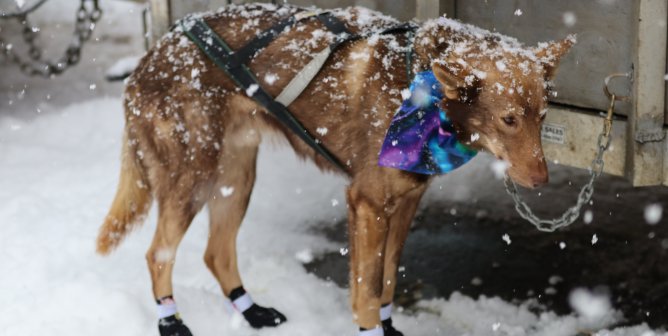Circuses: Three Rings of Abuse
Although some children dream of running away to join the circus, it is a safe bet that most animals forced to perform in circuses dream of running away from the circus. Colorful pageantry disguises the fact that animals used in circuses are captives who are forced—under threat of punishment—to perform confusing, uncomfortable, repetitious, and often painful acts. Circuses would quickly lose their appeal if more people knew about the cruel methods used to train the animals as well as the cramped confinement, unacceptable travel conditions, and poor treatment that they endure—not to mention what happens to them when they “retire.”
A Life Far Removed From Home
Because circuses are constantly traveling from city to city, it’s nearly impossible to meet animals’ complex, daily needs. The animals, most of whom are quite large and naturally active, are forced to spend most of their lives in the cramped, barren cages and trailers used to transport them, where they have only enough room to stand and turn around. Most animals are allowed out of their cages only during the short periods when they must perform. Elephants are kept in leg shackles that prevent them from taking more than one step in any direction. The minimum requirements of the federal Animal Welfare Act (AWA) are routinely ignored.
During the off-season, animals used in circuses may be housed in traveling crates or barn stalls— some are even kept in trucks. Such interminable confinement has harmful physical and psychological effects on animals. These effects are often indicated by what are called “abnormal repetitive behaviors” (ARB), such as head-bobbing, swaying, and pacing.1
The tricks that animals are forced to perform—such as when bears balance on balls, big cats jump through hoops, and elephants stand on two legs—are physically uncomfortable and behaviorally unnatural. The whips, electric prods, bullhooks, and other weapons used during circus acts are reminders that the animals are being forced to perform. These “performances” teach audiences nothing about how animals behave under normal circumstances.
Beaten Into Submission
Physical punishment has always been the standard training method for animals in circuses. Animals are beaten, shocked, and whipped to make them perform—over and over again—tricks that make no sense to them. The AWA allows the use of bullhooks, whips, electrical shock prods, or other devices by circus trainers.
The Wisconsin Historical Society forced elephants and other animals to perform every summer at a museum called Circus World in Baraboo. A PETA investigator documented that at Circus World, elephants Isa and Viola were forced to perform grueling tricks in shows twice a day, seven days a week, even though their feet were chronically swollen and they showed signs of other ailments. Following years of pressure from PETA, the Society announced that the elephants it has been forcing to perform will be “retired” after summer 2023—but that “animals will continue to be a vital part” of its shows. The elephants will reportedly live at a facility in Oklahoma operated by Carson & Barnes Circus, which chains “retired” elephants, breeds them, and exploits them for lucrative public feeding photo ops and other forms of entertainment.
Video footage shot during a PETA undercover investigation of Carson & Barnes Circus showed Carson & Barnes’ animal-care director, Tim Frisco, as he viciously attacked, yelled and cursed at, and shocked endangered Asian elephants. Frisco instructed other elephant trainers to beat the elephants with a bullhook as hard as they could and to sink the sharp metal bullhook into the animals’ flesh and twist it until they screamed in pain. The videotape also showed a handler who used a blowtorch to remove elephants’ hair as well as chained elephants and caged bears who exhibited stereotypic behaviors caused by mental distress.
Following decades of abusing animals and declining ticket sales, Ringling Bros. final performance was in 2017. 2 In 2022, Feld Entertainment announced that the circus would return in the fall of 2023 with a focus “on connections between the performers, and the audience.”3
Animals Rebel
These intelligent captive animals sometimes snap under the pressure of constant abuse. Others make their feelings abundantly clear when they get a chance.
Wayne Franzen, the founder and owner of Franzen Bros. Circus, was killed by one of the tigers he was exhibiting in front of 200 schoolchildren and their families in Carrolltown, Pennsylvania.4
A visitor to the Endangered Ark Foundation was “attacked without provocation by an adult elephant” while participating in an elephant encounter in Hugo, Oklahoma. The guest sustained “serious and lifethreatening injuries” and was left disabled and disfigured. ”5
What You Can Do
As more people become aware of the cruelty involved in forcing animals to perform, circuses that use animals are finding fewer places to set up their big tops. The use of animals in entertainment has already been restricted or banned in cities across the U.S. and in countries worldwide.
Take your family to see only animal-free circuses, such as Cirque du Soleil. PETA can provide you with literature to pass out to patrons if a circus that uses animals comes to your town. Find out about state and local animal protection laws, and report any suspected violations to authorities. Contact PETA for information on ways to get an animal-display ban passed in your area.
References
1G. Mason et al., “Why and How Should We Use Environmental Enrichment To Tackle Stereotypic Behaviour?” Applied Animal Behaviour Science 102(2007): 163–188.
2Greg Toppo, “Curtain Falls On Final Ringling Bros. Circus Performance,” USA Today, 22 May 2017.
3Yaseen Shah,”‘The Greatest Show on Earth’ is being ‘reimagined’ — without the animals,” Yahoo Finance, 24 June 2022.
4Associated Press, “Circus tiger kills trainer in front of children,” 8 May 1997.
5 Andrea DenHoed, “With lawsuit pending, bill proposes protecting controversial method of handling elephants,” NonDoc.com, 28 Feb. 2022







